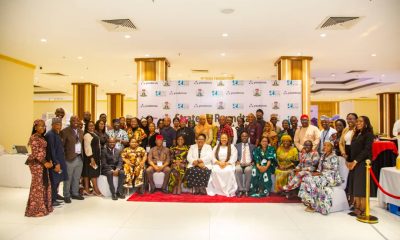COVER
Reps Seek VAT, Import Duty Waivers on Power Equipment

House of Representatives on Tuesday called on the Federal Government to issue Value Added Tax (VAT) and Import Duty Exemption Certificate (IDEC) waivers to contractors handling critical power projects across the country.
The resolution was passed by the House Committee on Public Accounts Committee (PAC), chaired by Rep.
Bamidele Salam during the resumed investigative hearing into the Accelerated Transmission-Distribution Interface Transmission Lines/Sub-stations contracts worth $231,004,002. 8 and N18,264,411,235.66 awarded since 2015.Representatives of the Transmission Company of Nigeria (TCN) and the Contractors told the committee that all the contracts have a great total of offshore components since the transformers are to be sourced from outside Nigeria.
Rep. Adelegbe Oluwatimehin moved a motion saying that the issue has become so troubling that an urgent step needs to be taken to rescue the power sector from the bad situation.
Mohammed Kabir Abdullahi solicited the House intervention to the committee in a manner that would ensure the completion of the projects, which he said have already suffered so much delay.
He said, “We will be so happy and delighted to see the quick resolution of this. TCN, it appears, we got stuck because we have done the necessary-two letters to the Ministry of Power and we copied Finance at that time too, with the expectation that it will get to the Presidency.
“But up till now, we have not gotten any response unfortunately.
“Not only this project. There are other TCN projects also that are affected by this. There are some being funded by the World Bank and all that.”
Rep. Salam wondered why TCN did not approach regulatory agencies and stakeholders to support them in getting waivers for the equipment that are trapped at the seaports.
“There is no doubt that there have been administrative lapses. No doubt, I went through the letter and actually pointed that out to him earlier.
“If you read the letter, you will see that these are part of the things that affect our institutions.
“There are things that need to be done timeously. There are ways of doing things especially in the National Assembly as an Institution.
“I wish agencies know the powers of the Institution and are able to leverage on such powers and influence to get so many things done.
“You have a Committee on Power which oversees the TCN, I suppose and all other agencies.
“If you had approached them all these years, I am sure they would have taken steps to ensure that you get the waivers extended to cover both the IEDC and the VAT components of your projects. But apparently, all those things were not done.
“We are now in a situation where we have to clear that mess.
“We are clearing that mess because the Federal Government under His Excellency Ahmed Bola Tinubu has made the issue of power a very central point of his priority programs.
“Ours is to make sure that we also support the delivery of that vision. And there is no way it can be delivered if this one is not sorted out,” he stated.
COVER
FCMB Group Records N529.2bn in Half Year Gross Earnings

By Tony Obiechina, Abuja
FCMB Group Plc has announced its financial results for the half-year period ended June 30, 2025, recording gross earnings of N529.2bn, representing a 41.3 percent increase compared to N374.5bn posted in the corresponding period of 2024.In its unaudited financial statements for the period ended March 31, 2025, and filed with the Nigerian Exchange Limited on Tuesday, the growth was primarily driven by a 70.
3 percent surge in interest and discount income, which rose to N458. 4bn from N269.2bn in H1 2024. This strong performance reflects improved yields on earning assets and expansion in the Group’s loan book, which reached N2.38tn as of 30 June 2025.Net interest income climbed to N207.4bn, up 95.3 percent from N106.2bn in the same period last year. Despite this, interest expense rose by 54.1 percent to N251.0bn, compared to N163.0bn in 2024.Net fee and commission income also rose significantly by 51.3 percent to N37.9bn from N25.1bn. This growth was aided by a 30.9 per cent rise in fee and commission income to N47.4bn, even as fee and commission expenses fell by 14.9 per cent to N9.5bn.However, net trading income declined by 29.3 per cent to N22.2bn from N31.4bn, while other gains fell sharply to N696.3m from N37.1bn, reflecting lower revaluation and disposal gains on financial instruments.Operating expenses increased across the board. Personnel expenses rose 34.4 percent to N48.3bn, and depreciation and amortisation grew 24.8 per cent to N8.1bn, while general and administrative expenses jumped 59.4 per cent to N57.2bn. Other operating expenses rose 49.4 per cent to N39.6bn.Despite these cost increases, the Group delivered a profit before tax of N79.1bn, a 23.2 per cent rise from N64.2bn in H1 2024. After tax, profit stood at N73.4bn, reflecting a 23.4 per cent year-on-year growth from N59.5bn.Other comprehensive income for the period was N6.9bn, up from N24.8bn in the previous year. This brings total comprehensive income for the Group to N80.3bn for H1 2025, slightly below the N84.3bn reported in H1 2024, due largely to lower unrealised gains from foreign currency translation differences.Total assets as of June 30, 2025, stood at N7.54tn. Customer deposits rose 39.9 per cent to N4.54tn, while loans and advances to customers increased modestly to N2.38tn.COVER
NNPCL Backstraps, Rules Out Port Harcourt Refinery Sale

By David Torough, Abuja
The Nigerian National Petroleum Company Limited (NNPCL) has officially ruled out the sale of the Port Harcourt Refining Company, reaffirming its commitment to completing high-grade rehabilitation and retention of the plant.Group Chief Executive Officer of NNPC Ltd, Bayo Ojulari, made the announcement during a company-wide town hall meeting at the NNPC Towers in Abuja, ending weeks of speculation over the future of the country’s most prominent state-owned refining asset.
A statement by the company management yesterday said, “The Nigerian National Petroleum Company Limited has officially ruled out the sale of the Port Harcourt Refining Company, reaffirming its commitment to completing high-grade rehabilitation and retention of the plant.”He described selling the Port Harcourt Refining Company as “ill-advised and sub-commercial.”Ojulari’s remarks come amid rising public concern sparked by his earlier comments at the 2025 OPEC Seminar in Vienna, where he said “all options are on the table” regarding the future of Nigeria’s refineries.The statement triggered a wave of speculation that a sale might be imminent.He stated that the new position of the firm was not a shift. Rather, it is informed by ongoing detailed technical and financial reviews of the Port Harcourt, Kaduna and Warri refineries.The statement added, “The ongoing review indicates that the earlier decision to operate the Port Harcourt refinery, before full completion of its rehabilitation, was ill-informed and sub-commercial.”Although progress is being made on all three, the emerging outlook calls for more advanced technical partnerships to complete and high-grade the rehabilitation of the Port Harcourt refinery.”Thus, selling is highly unlikely as it would lead to further value erosion.”At the town hall, the Executive Vice Presidents presented progress reports from the Upstream, Downstream, Finance, Business Services, Gas, Power, and New Energy businesses, highlighting operational achievements, ongoing reforms, and areas requiring attention.According to the statement, the announcement reinforces NNPC’s mandate as a strategic custodian of national energy infrastructure and reflects a firm resolve to deliver on the complete rehabilitation and long-term viability of Nigeria’s refineries.It also signals continuity in the Federal Government’s broader energy security objectives and a commitment to retaining critical assets under national control.Feedback during and after the session revealed a workforce energised and aligned with the leadership’s vision. Described as “reassuring,” “transformational,” and “sustainable”, the atmosphere reflected an optimistic outlook among employees and hopefulness about the company’s evolving strategic direction.“NNPC Ltd will continue to reposition itself as a commercially driven, professionally managed national energy company, grounded in transparency, focused on performance, and unwavering in its responsibility to its number one stakeholder group, Nigerians,” Ojulari concluded.The statement added that the declaration was received with applause from hundreds of staff attendees, who described the position as a renewed sense of business-focused direction across the organisation.NNPCL Drills Four Oil Wells in Kolmani, BauchiA Director at the Nigerian National Petroleum Company Ltd, Yusuf Usman, said the company has drilled four oil wells in the Kolmani area of Bauchi State.He also restated the commitment of the company to the exploration and development of oil and gas resources in the northern region of the country.Usman said this on Wednesday in Kaduna at the Sir Ahmadu Bello Memorial Foundation’s two-day interactive Session on Government-Citizens Engagement.Usman stated, “So far, the NNPCL has drilled four wells in the Kolmani area of Bauchi State, and is currently evaluating the appropriate technology to be deployed for the next phase of drilling operations.“In support of President Tinubu’s Compressed Natural Gas (CNG) Initiative, five CNG and Liquefied Natural Gas (LNG) plants are under construction in Kogi.“These plants are expected to enhance gas supply and accessibility across the northern region.”Usman highlighted some of the achievements of the company under the Tinubu-led administration that benefited the north and other parts of the country.COVER
Nationwide Nurses Strike Cripples Health Services across States

By Attah Ede, Makurdi, Mike Tayese, Yenagoa and Dan Amasingha, Minna
Healthcare delivery across Nigeria suffered major disruptions yesterday as members of the National Association of Nigeria Nurses and Midwives (NANNM) commenced a seven-day warning strike, leaving patients stranded and hospitals overwhelmed.
In Benue State, the strike kicked off in full compliance with directives from the national headquarters of NANNM. The state chairman, Nurse Tahav Karshio, speaking through his media aide, Nurse Moses Mhange, confirmed that nurses and midwives in General Hospitals, the Benue State University Teaching Hospital, Federal Medical Centre and primary health centres across all local government areas had withdrawn their services.“Yes, there is a national directive for us to commence the strike and we have complied,” Karshio stated. “We expect full compliance from all our members by tomorrow.”When reporters visited major healthcare facilities like the Federal Medical Centre and General Hospital in North Bank, Makurdi, only doctors and student health workers were seen rendering skeletal services.In Bayelsa State, the impact was equally severe. Public hospitals began discharging patients due to the absence of nurses.At the Primary Health Centre in Amarata, Yenagoa, doors remained shut as early as 9:00AMMeanwhile, patients at the Federal Medical Centre (FMC) were left unattended, wandering around the facility in search of help.The Chairman of NANNM at FMC Yenagoa, Liberia Woyengibarafagha Progress, said the union was enforcing strict compliance with the strike, including a ban on skeletal services.Reinforcing this, NANNM National Treasurer and South-South Coordinator, Amos Ombufa warned that if demands remain unmet after the seven-day warning strike, a 21-day ultimatum will follow, leading potentially to an indefinite industrial action.“No skeletal services will be allowed. The strike is total, especially in the South-South zone,” Ombufa insisted.The Public Relations Officer of FMC Yenagoa, Akpedi Bernard, acknowledged the disruption and expressed concern over the strike’s effect on Bayelsa’s only federal tertiary hospital. He noted that the management had mobilized doctors and senior nurses to provide emergency services during the strike period.In Oyo State, services were similarly affected. At Adeoyo Hospital in Ibadan, many patients were discharged, while new admissions were suspended.Most wards stood empty, and critical cases were being referred to private facilities. Relatives of some patients, including Adegoke Rahman, lamented the absence of nurses, adding that even post-surgery patients were left under the care of doctors alone.A doctor at the hospital, who asked not to be named, confirmed that while medical doctors were attending to outpatients, no new admissions were being taken due to the strike. He disclosed that the hospital had advised inpatients to leave due to lack of nursing support.The Oyo State NANNM Secretary, Comrade Emmanuel Aina, affirmed the union’s resolve to press home their demands, which include improved welfare packages, revised shift and uniform allowances, establishment of a dedicated nursing department at the Federal Ministry of Health, and mass recruitment of nurses.As the strike enters its crucial days, the ball is now in the court of the Federal Government, with the health sector’s stability hanging in the balance.Niger Contain Cholera Outbreak, Discharge over 320 PatientsNiger State Government has disclosed that the recent cholera outbreak in parts of the state has been brought under control, with over 320 patients discharged and free from the disease.Speaking during a live radio programme tagged Media Chat, organised by the State Ministry of Information and Strategy and monitored in Minna, the state capital, the Commissioner for Primary Health Care, Dr. Ibrahim Ahmed Dangana, confirmed that currently, fewer than 10 persons are on admission across the state.The Commissioner stated further that, “Water treatment kits have been donated to help over 14,000 households to curb the epidemic disease.”According to Dr. Dangana, “We recorded 14 deaths so far; and out of the 327 patients hospitalised, as we speak, we have discharged virtually all of them and have fewer than 10 of them still on admission across the state for cholera.”He noted that after the outbreak, the state immediately activated the State Inter-Sectoral Committee on Emergency Preparedness and Response, the Emergency Operation Centres (EOCs), and the Disease Surveillance Systems in the 274 wards and communities across the state.“We identified isolation centres and, similarly, we have what we call Cholera Treatment Units (CTUs) in all the 25 LGAs across the state, and these have really helped us in curbing the spread,” he declared.Dr Dangana said that, “The Ministry, with support from various MDAs and partners like the United Nations Children’s Fund (UNICEF), was very active and I can tell you that we are winning the battle against cholera.”He stated further that the Ministry has doubled the level of sensitisation by reaching out to over 16,000 schoolchildren, and has visited markets, religious and traditional institutions to create awareness.Also, when our correspondent spoke with the Health Specialist, UNICEF Kaduna Field Office, Dr Idris Baba, he said, “The supplies made so far are enough to treat all cases currently identified and admitted in the state.”Accordingly, he said, “Some of the items are community and periphery AWD kits, cholera kits, 40 cholera beds, Ringer’s lactate, normal saline with giving sets. “Others are antibiotics, scrubs, disposable gowns, heavy-duty and surgical hand gloves, boots, water purification tablets, chlorine solutions, calcium hypochlorite, water testing and stool testing RDTs,” he maintained.The Commissioner for Information and Strategy, Hajiya Binta Mamman, said the state swung into action immediately after it was confronted with the endemic, by carrying out sensitisation efforts, and that all hands were on deck to curb the situation.

















